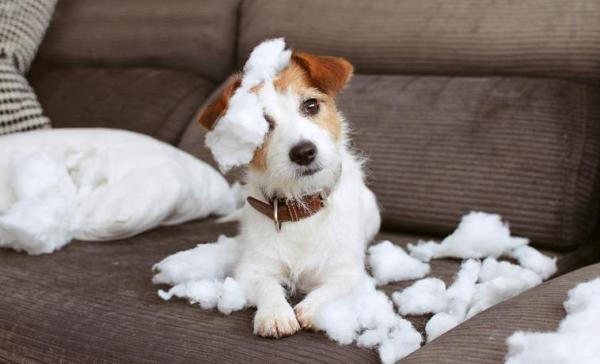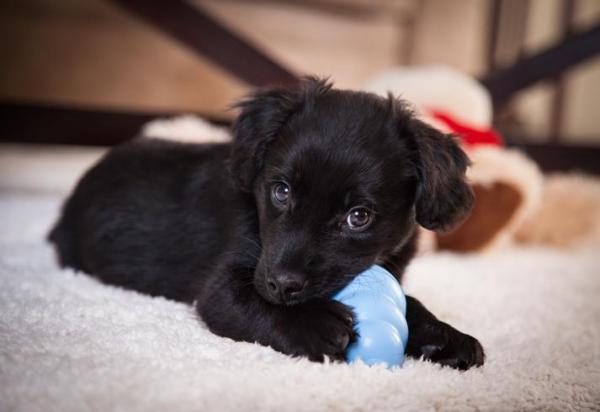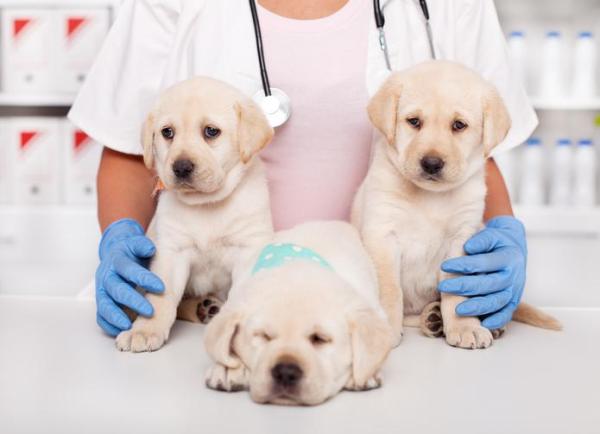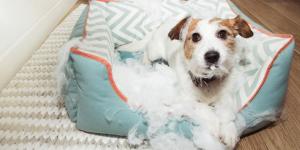When Do Puppies Stop Chewing Everything?



See files for Dogs
Unlike most humans, dogs use their mouths to interact with almost anything in their environment. As a puppy, they have to develop this skill so they are able to prosper. This can lead to them biting everything in sight as they explore the larger world around them. It is a natural instinct which we should not scold them for. Instead, we can guide them into channeling their biting and chewing tendencies into something more tolerable for both them and us.
At AnimalWised, we answer the question, “when do puppies stop chewing everything?” We show you why biting is such an important part of a puppy's development, but also why it needs to be controlled for everyone's well-being.
My puppy bites everything
One characteristic behavior which often defines a puppy is their tendency to bite. Shoes, toys, furniture, clothes, cables and even ourselves can become surrogates for chew toys. Puppies can bite consistently and will not yet have learned when to stop or which objects are inappropriate to chew.
These little dogs will manifest exploratory behavior as part of their normal development. It is typical of young in various species, especially among mammals. Thanks to investigating their surroundings and its limits, the puppy can acquire lessons which will serve them well throughout their lifetime. Although dogs have paws, they do not have opposable thumbs as we do. They require other means to manipulate objects in their environment, leading to use of their mouth for this purpose.
Additionally, puppies have what is known as ‘baby teeth’. As with humans, these are present in the early stages of life. They are smaller and finer than the adult teeth which will eventually grow to replace them. The time when the permanent teeth being to push through is often when biting behavior occurs most in puppies. They try to relieve the frustration of the situation by teething on almost anything.
The time when dogs lose their deciduous teeth (another word for baby teeth) is about 4 months of life. As the adult teeth grow in and become permanent, the puppies tend to reduce their teething. It should be that this is when they stop chewing on everything, or at least do it with reduced intensity. Whenever a puppy stops biting everything, it is important to know it is not their fault. They are simply adhering to their nature and they are not being in any way malicious.

My dog bites my hands
Although biting is normal behavior in puppies, it is not a desirable one when they become adults. We need to find a way to provide bite inhibition. This is a learned behavior whereby the dog learns not to bite hard on something they shouldn't. This is something which is often learned with their siblings and mother. A mother or another puppy will show them strongly their intolerance to biting. It is important to know that this type of biting is part of play behavior and not usually a sign of aggressiveness.
Although biting is normal, it will lead to problems if the puppy does not learn bite inhibition. It might be funny or cute if a puppy bites without any pain. When a fully grown dog bites you, it can cause serious pain and spread disease. Even smaller dogs can cause serious damage, especially with vulnerable people such as children or the elderly.
Some puppies will learn bite inhibition quickly and naturally. Others will need a little assistance. If a puppy bites while playing, you might be able to simply interrupt the game and give them a chew toy instead. We need to repeat this as many times as necessary until they assimilate the correct behavior. When they do behave correctly, we will congratulate them with treats, caresses or positive words. In a short time they should stop biting everything and interact more positively.
My puppy won't stop biting
Sometimes a puppy bites everything, but doesn't give up even when we call their attention. In these cases, we need to look at their living situation. If they spend a lot of time alone, are under stimulated or are experiencing stress, then their biting might be related. Biting and destructive behaviors in general are common behavioral problem associated with various issues.
To correct these behavioral problems, we need to look at the cause of the destructive behavior. It is not a problem with bite inhibition as much as it is trying to relieve frustration. To reduce frustration, we can improve their environmental enrichment. We do this by providing distractions and interactions in their environment with which they can engage.
We will also need to provide the dog with more attention, more company and exercise. These are essentials which can reduce anxiety. If it is a puppy, then we need to be careful going outside as they need to have their vaccination schedule initiated.
If we are unable to redress the situation on our own and stop the dog from chewing everything, then we will need to seek an ethologist. This is someone who knows canine behavior and can look at the specific issues affecting the individual dog. There may be reasons for their stress which we cannot discern on our own. They will also be able to provide some practical guidance as to how you can improve their life.

When do puppies stop biting?
As we explain above there are various reasons why a dog will not stop chewing everything. One of them is to do with the loss of baby teeth and development of permanent adult teeth. While it will depend on certain factors (such as the breed of dog), a puppy should finish the process of developing their adult teeth at 7 months. After this time, they should reduce the amount of chewing and biting.
Even at the age of 7 months, the dog will continue to be a puppy. This means they are playful and exploratory, behaviors which will continue even after they stop teething. From around one year, most dog breeds will have matured enough to stop chewing on everything.
It is possible the dog will continue to bite and chew on things they shouldn't. While this could be due to the aforementioned stress, it could also be due to separation anxiety. If we spend a lot of time with our puppy and then stop when we go to work, they may become scared their security is leaving with you. Another reason for excessive chewing in dogs could also be a lack of proper education on our part. We need to teach basic commands and training to both strengthen our bond and improve their safety.
My dog bites other dogs while playing
Games during which dogs exchange bites are common. They can seem quite aggressive at times, but it is more common for them to hold their jaw over the other dog without biting down. They may even growl, but you can generally tell when play turns serious. This type of play is used to gauge the other's strength, mark their limits and, in the case of puppies, see how far they can bite without harming anyone.
Some caregivers can't tell between play fighting and actual aggression. They may intervene too quickly, even though the behaviors are completely healthy. We need to look at the dog's posture and body language. They will be able to tell us if they are being serious or only playing. If the dog is having fun, they will often plant their front legs on the ground and angle their body. Raising their rump and wagging their tail show the other dog the type of interaction they are looking for.
On the other hand, if a dog remains motionless while watching what the other does, bristles their fur, snarls or bares their teeth, they are likely to want to fight. If they pounce on the other or bite aggressively, then there is a problem. If we see our dog becoming aggressive regularly, then we need to seek a professional canine educator to prevent this behavior.
It is also important to mark the difference between a dog which likes to nibble and bite in a playful way as compared to actual biting. A healthy and happy dog can carry out the former without incurring any trouble. If we repress healthy expressions during pay, it can cause them to be stressed as they don't understand the problem. We should also be careful to ensure other dogs do not play too rough with ours.
When does a puppy stop peeing at home?
Chewing and biting are not the only problematic behaviors of puppies. Caregivers will often wonder when their puppy will stop peeing in the home. The two behaviors are linked as they are to do with the maturation process of the dog. In the case of urination and sphincter control, there are many variables which depend on each individual dog and their living conditions.
If we are able to spend a lot of time with the puppy, then we can take them outside to urinate more. It provides us with more learning opportunities. Even so, teaching a puppy to urinate our on the street can last a few months. Some dogs are able to endure throughout the day and wait for walks to urinate. In these cases, the wait overnight may simply be too long and they will urinate inside.
The situation can last until approximately one year of life, unless we walk them very early in the morning and very late at night. This means we reduce the hours they have to spend between going. Of course, it is very important not to scold the puppy. They will not understand why and it can worsen the situation rather than improving it.

If you want to read similar articles to When Do Puppies Stop Chewing Everything?, we recommend you visit our Behavioral problems category.









